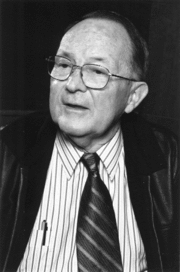查莫斯·約翰遜
出自 MBA智库百科(https://wiki.mbalib.com/)
查莫斯·約翰遜(Chalmers Ashby Johnson)——日本發展模式概念之父目錄 |
查莫斯·約翰遜(Chalmers Ashby Johnson),被稱為日本發展模式概念之父,美國日本政策研究所所長,東亞問題專家。他認為日本政府實際上培育了產業的發展,而在西方經濟中政府只是制定游戲的規則。約翰遜把這種發展方式歸結為日本的產業結構發生了巨大的變化。在20世紀50年代的前半期和60年代的前半期之間,日本的纖維和紡織品的出口從30%下降到8%,而機械的出口從14%上升到39%。約翰遜認為在60年代和70年代早期的產出和勞動生產率的迅速增長單憑經濟,制度和文化是不能解釋的,並斷言在某些經濟戰略產業中,政府的產業政策造成了投資率的差異。
查默斯·約翰遜教授先後在加州大學伯克利和聖地亞哥分校任教三十年,曾任這兩所大學亞洲政治學領域的講座教授,在伯克利還任中國研究中心主任和政治系主任。其新著《反彈三部曲》之第一部《反彈:美利堅帝國的代價與後果》(Blowback:The Costs and Consequences of American Empire,2000)和第二部《帝國的悲哀:軍國主義、機密體制與共和國的終結》(The Sorrows of Empire:Militarism,Secrecy,and the End of the Republic,2004)已由紐約國際都市圖書公司(Metropolitan Books)出版;
Chalmers Ashby Johnson (born 1931) is an American author and professor emeritus of the University of California, San Diego. He is also president and co-founder of the Japan Policy Research Institute, an organization promoting public education about Japan and Asia. He has written numerous books including, most recently, three examinations of the consequences of American Empire: Blowback (book), The Sorrows of Empire, and Nemesis: The Last Days of the American Republic.
Johnson was born in 1931 in Phoenix, Arizona. He earned a Bachelor of Arts degree in Economics in 1953 and a Master's degree and a Doctor of Philosophy in political science in 1957 and 1961 respectively. All of his degrees were from the University of California, Berkeley. During the Korean War, Johnson served as a naval officer in Japan. He taught political science at the University of California from 1962 until he retired from teaching in 1992. He was best known early in his career for scholarship about China and Japan.
Johnson set the agenda for ten or fifteen years in social science scholarship on China with his book on peasant nationalism. His book MITI and the Japanese Miracle, on the Japanese Ministry of International Trade and Industry was the preeminent study of the country's development and created the bustling subfield of what could be called the political economy of development. He coined the term "developmental state." As a public intellectual, he first led the "Japan revisionists" who critiqued American neoliberalism with Japan as a model, but also attacked Japan for protectionism. During this period, Johnson acted as a consultant for the Office of National Estimates, part of the Central Intelligence Agency, contributing to analysis of China and Maoism.[1]
Johnson was elected a Fellow of the American Academy of Arts and Sciences in 1976. He served as Director of the Center for Chinese Studies and Chair of the Political Science Department at Berkeley, and held a number of important academic posts in area studies. He was a strong believer in the importance of language and historical training for doing serious research. Late in his career he became well known as a critic of "rational choice" approaches, particularly in the study of Japanese politics and political economy.
Johnson is today best known as a sharp critic of American imperialism. His book Blowback won a prize in 2001 from the Before Columbus Foundation, and was re-issued in an updated version in 2004. Sorrows of Empire, published in 2004, updated the evidence and argument from Blowback for the post-9/11 environment and Nemesis concludes the trilogy. Johnson was featured in the Eugene Jarecki-directed film Why We Fight (2005 film), which won the 2005 Grand Jury Prize at the Sundance Film Festival. In the past, Johnson has also written for the Los Angeles Times, the London Review of Books, Harper’s Magazine, and The Nation
Johnson believes the enforcement of American hegemony over the world constitutes a new form of global empire. Whereas traditional empires maintained control over subject peoples via colony, since World War II the United States has developed a vast system of hundreds of military bases around the world where it has strategic interests. A long-time Cold Warrior, Johnson experienced a political awakening after the collapse of the Soviet Union in 1989, noting that instead of demobilizing its armed forces, the US accelerated its reliance on military solutions to problems both economic and political. The result of this militarism (as distinct from actual domestic defense) is more terrorism against the US and its allies, the loss of core democratic values at home, and an eventual disaster for the American economy.
- Peasant Nationalism and Communist Power (1962) (ISBN 0-8047-0074-5)
- An Instance of Treason: Ozaki Hotsumi and the Sorge Spy Ring (1964; expanded in 1990)
- Change in Communist Systems (1970), By Jeremy R. Azrael, Chalmers A. Johnson, ISBN 0-8047-0723-5
- Conspiracy at Matsukawa (1972)
- Ideology and Politics in Contemporary China (1973) By John Israel, Chalmers A. Johnson, ISBN 0-2959-5247-4
- Japan's Public Policy Companies (1978) ISBN 0-8447-3272-9
- Revolutionary Change (1982) ISBN 0-316-46730-8
- MITI and the Japanese Miracle (1982)
- The Industrial Policy Debate (1984) ISBN 0-9176-1665-0
- Politics and productivity: the real story of why Japan works (1989) By Chalmers A. Johnson, Laura D'Andrea Tyson, ISBN 0-8873-0350-1
- Japan: Who Governs? -- The Rise of the Developmental State (1995)
- Blowback: The Costs and Consequences of American Empire (2000, rev. 2004) ISBN 0-8050-6239-4
- The Sorrows of Empire: Militarism, Secrecy, and the End of the Republic (2004) ISBN 0-8050-7004-4
- Nemesis: The Last Days of the American Republic (2007) ISBN 0-8050-7911-4
- ↑ Nic Paget-Clarke, 2004, "Interview with Chalmers Johnson Part 2. From CIA Analyst to Best-Selling Scholar" (In Motion Magazine). Access date: December 5, 2007.








